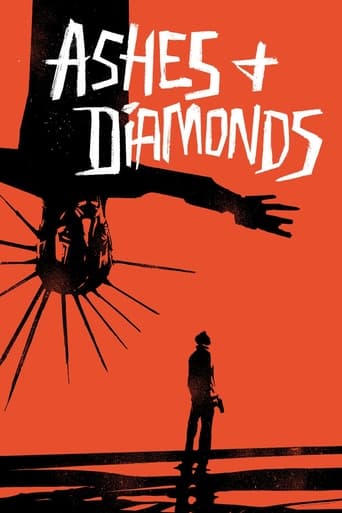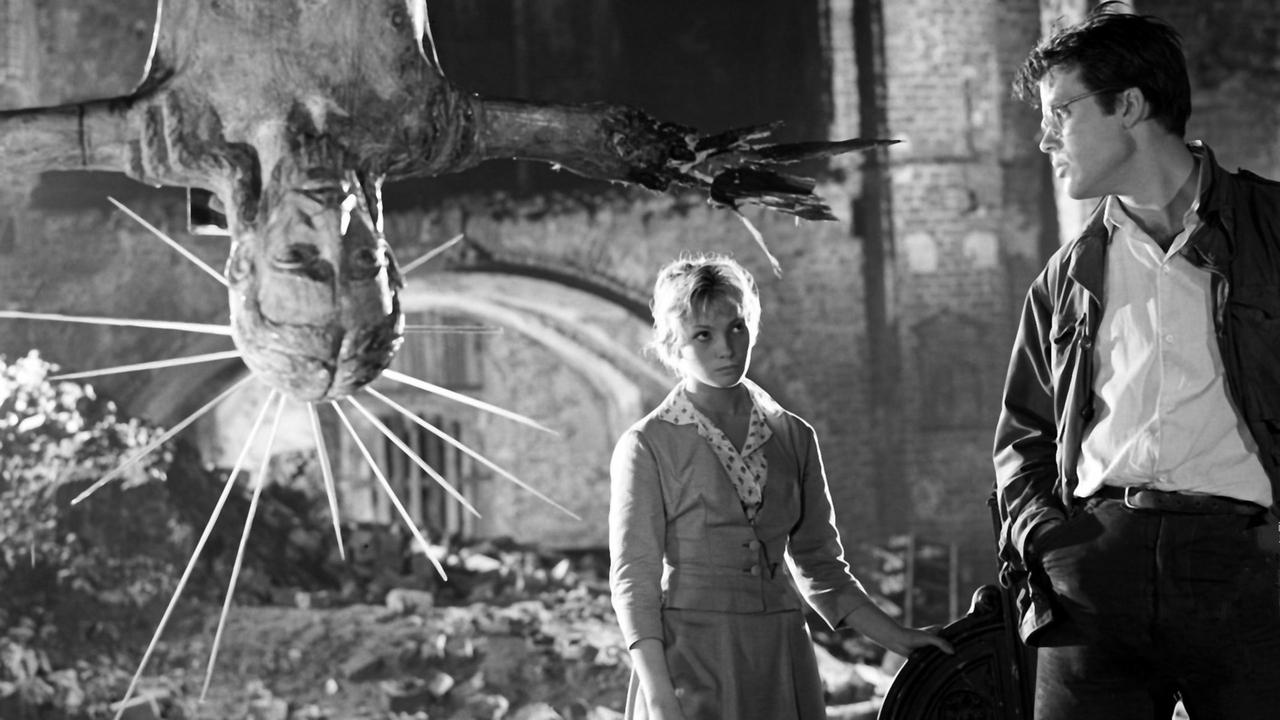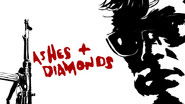Boba_Fett1138
This is a movie that becomes mostly great due to its fine directing approach. The movie at times picks an artistic approach but without disconnecting itself ever from its viewers.It's really the way how this movie looks that made this an interesting and good watch for me. It features some beautiful black & white cinematography and it has some some really strong and unforgettable images in it.The story in itself is being kept deliberately small and simple. The movie very rarely dwells, which is a good thing but it at the same time also prevents this movie from making a truly lasting impression with a good or powerful story. In my opinion the movie was lacking this, which prevented me from truly regarding this movie as a perfect movie, or a must-see classic, even though it is generally being regarded as perhaps the best and most definitive Polish movie ever made.Neverhteless, the characters all do work out well, due to the movie its story and overall approach. It was also truly a pleasure to watch Zbigniew Cybulski act, who is known as the Polish James Dean. He was truly great and really solely carried the movie, for most part.Due to the fact that the movie is being kept simple and small, there is also very little to indicate in this movie that it's actually one being set during WW II. Don't know whether this was done intentionally or not but anyway, I liked that about this movie. It's a war movie without the war and everything that goes along with that and basically all that ever indicates that there is war going on is shown by the presence of a few soldiers.A solid but above all things beautifully directed movie, by Andrzej Wajda.8/10http://bobafett1138.blogspot.com/
esteban1747
I have seen this film several times and often I asked myself how the director Andrzej Wajda was allowed to film something that clearly shows the corruption of the new governing bodies in post-war Poland. This is a film of 1958, i.e. Poland well occupied by the Soviet troops and only 2 years after the Hungarian massacre. The acting of already disappeared Zbigniew Cybulski as Maciek is really impressive and reminds me to some extent James Dean playing "Rebel without a Cause". The personality of Maciek is difficult to understand if one ignores the suffering of Polish people during the war. Once this bloody confrontation finishes the Soviet came over and put their loyal people in the important posts of the government. The fact is that those soviet loyalists were not the appropriate ones, often corrupted and looking to climb for better position. The presence of the Soviet officers in the official parties and ceremonies was very common and this can also be well seen. Ewa Krzyzewska plays the role of a young lady working in a restaurant,she wants to live and to love, but even her dreams cannot become a reality. The film draws what was then wrong in Poland and how wrong the people felt and behave. Maciek is used by an anticommunist violent movement, in fact he wants to live differently, to stop fighting, to live and to love too. This film is really one of the classic of the filmography of Eastern Europe under the domination of the Soviets.
europolismovie
The third in Director Andrej Wadja's war trilogy, Ashes and Diamonds is set in Poland on the last day of WW2. The German High Command have issued their unconditional surrender and the Communists quickly fill the vacuum left by Hitler's goose-steppers and set up shop. Warsaw is lousy with rats and not all of them are of the rodent variety as power hungry bureaucrats jostle for position in the new order.Having spent the last half a decade under the Nazi junta; the prospect of a future under Stalin's jackboot is met with keen opposition. Maciek, a resistance fighter, is ordered to kill a local Socialist party official, which he is more than happy to do, but soon discovers he has killed two innocent civilians instead.Maciek books a room at a rundown hotel where his quarry is staying. While he waits for the right moment to make amends he meets and falls in love with the barmaid Krystyna. His connection to the girl leads him to rethink his part in the endless cycle of violence.The central role of Maciek was played by the brilliant Zybigniew Cybulski who came to be known as the 'Polish James Dean.' Dean's death in a highway smash in 1955 meant he would never fulfil his promise and so would forever be frozen in movie goer's minds as a deeply troubled boy. Cybulski was 30 when he played the role that made him and gives us a glimpse of what his western counterpart could have achieved. Cybulski's Maciek is a worldly wise, vodka fuelled skirt chaser, (not a million miles away from his real life persona allegedly) and far from being made twisted and bitter by his war experiences, Cybulski plays the character as a man who laughs at the cruel joke of life that his been played on all of us and is determined to "have fun and not be swindled" even in the face of imminent annihilation.It was a conscious decision on Wadja and Cybulski's part that despite their story taking place in 1945, ASHES AND DIAMONDS' central character was going to be 'all out' 50's cool. Parts Brando, Dean and Clift Maciek, in his army fatigues and 'sun-glasses after dark' became a symbol for Polish teenagers who would emulate his style for years to come; and his Anna Karenna-esquire death beneath the wheels of a late night train in 1967 only exacerbated his legendary status. Even now we see shades of him in any number of Hong Kong 'glock operas' and John Cusack's 'assassin in Raybans' from Grosse Point Blank is a clearly a direct ancestor.Often charged with being overloaded with symbolism as scenes are obscured by upside down crucifixes; characters rendered almost invisible in morning light whilst unfurling flags or inexplicably joined by white horses as they ponder the possibilities of a brighter future, ASHES AND DIAMONDS makes no secret of its Expressionist credentials. The youthful hero dying on a mountainous rubbish dump to the accompaniment of screeching crows is an image lifted almost directly from Van Gogh's apocalyptic 'Crows over Wheatfield's'.Two years after Cybulski met his destiny on the snowy platform of Wroclaw station Wadja made EVERYTHING FOR SALE about an actor missing from the set of a film. The missing actor was clearly meant to be Cybulski who even in death dominated every scene. It still stands as probably the best film an actor never made.
bandw
When Germany surrendered in WWII on May 8, 1945 there was much celebration in the West, but the mood in Poland was not altogether jubilant - the Nazis had been defeated but the Soviet occupation was settling in for a long stay. The complexity of the political situation is reflected in this film but, short of having been there or studied the history, an encompassing understanding of the chaotic situation must remain incomplete I think. However, this film is a great example of how focusing on the lives of a few characters in a single twenty-four hour period can illuminate significant historical facts in the context of an intriguing story.The characters are representative of the factions existing in Poland on the day of the German surrender. You have: Maciek, a resistance fighter who had opposed the Germans and was continuing the struggle against the communists; Szczuka, a Pole who embraced the communists and had become a party official; Drewnowski, whose sympathies were with the resistance, but who hedged his bets by playing on both sides; people sucking up to the new power structure for purely personal gain; and most folks, who were just trying to get by.Moral ambiguities abound, raising issues with no easy answers. In an attempt to kill Szczuka Maciek mistakenly kills two innocent workers returning from a day of work at a local cement plant. Is continued resistance worth the sacrifice of innocent Polish lives? Maciek is conflicted about this and when Maciek's superior officer asks his superior if it is really necessary to kill Szczuka, he gets a resounding "Yes," followed by the question, "Is this the Poland you fought for?" Ordinary citizens bemoan the fact that any killing of Poles by Poles is wrong, but the very existence of the resistance shows that there is no universal agreement on that. Though Szczuka may be on the wrong side, he is not played as a villain and in fact he seems sincere in his convictions. You believe there is no evil intent when he says, "The end of the War isn't the end of our fight. The fight for Poland and what kind of country it is to become has just begun." Having met and become infatuated with the beautiful Krystyna, Maciek is torn between giving up on the resistance and pursuing personal goals. But his superior officer's implication that to do so would be traitorous to the cause resonates with him and, when he has an opportunity to kill Szczuka, he casts his lot with the cause he has fought for - a cause he knows is probably doomed, and will doom him. Better to die for a doomed cause you believe in than live a lie? Or, is it better to work within the system in trying to achieve heretical ideals?Zbigniew Cybulski is a quirky but charismatic actor. His unexpected facial expressions and body movements create a unique, memorable character. All the actors are good, and the melancholy score is perfect for the mood of the film - it is reminiscent of some of the more plaintive works of Nina Rota.A most impressive aspect of this film is the black and white cinematography. Every scene is artistically composed and there are many scenes that achieve a stunning effect, such as the one between Maciek and Krystyna in the ruined church with a life-sized crucifix hanging upside down and swaying to the sound of an eerie squeak, perhaps suggesting that the church had been turned on its head, or otherwise marginalized. The initial scenes also suggest the impotence of religion during this difficult time. When one of the innocent workers tries to escape Maciek's shots, he seeks refuge in a church, but the door is locked. After the door jam has been blown off the worker falls through the doorway, revealing a mangled crucifix inside.This film encourages one to do a little study of Polish history. Poland lost over five million civilians in the war, about three million of them Jews. This out of a population of thirty-five million. Poland also lost over 400,000 military personnel fighting for the allies, about the same number that the United States lost. Total U.S. casualties during the war accounted for about a third of one per cent of the total population, compared with a 16% loss of the Polish population. And, in the end, what Poland got for its sacrifice was a fifty year period of Soviet occupation. The segment of Norwid's poem that Maciek recites, "Will only ashes remain, and chaos, whirling into the void, or will the ashes hold the glory of a starlight diamond?" is particularly poignant in view of what happened.This film is in a league with the best black and white films of Bergman and Fellini.



 AD
AD






